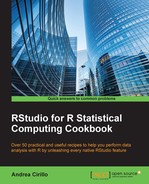Why should you read RStudio for R Statistical Computing Cookbook?
Well, even if there are plenty of books and blog posts about R and RStudio out there, this cookbook can be an unbeatable friend through your journey from being an average R and RStudio user to becoming an advanced and effective R programmer.
I have collected more than 50 recipes here, covering the full spectrum of data analysis activities, from data acquisition and treatment to results reporting.
All of them come from my direct experience as an auditor and data analyst and from knowledge sharing with the really dynamic and always growing R community.
I took great care selecting and highlighting those packages and practices that have proven to be the best for a given particular task, sometimes choosing between different packages designed for the same purpose.
You can therefore be sure that what you will learn here is the cutting edge of the R language and will place you on the right track of your learning path to R's mastery.
Chapter 1, Acquiring Data for Your Project, shows you how to import data into the R environment, taking you through web scraping and the process of connecting to an API.
Chapter 2, Preparing for Analysis – Data Cleansing and Manipulation, teaches you how to get your data ready for analysis, leveraging the latest data-handling packages and advanced statistical techniques for missing values and outlier treatments.
Chapter 3, Basic Visualization Techniques, lets you get the first sense of your data, highlighting its structure and discovering patterns within it.
Chapter 4, Advanced and Interactive Visualization, shows you how to produce advanced visualizations ranging from 3D graphs to animated plots.
Chapter 5, Power Programming with R, discusses how to write efficient R code, making use of the R objective-oriented systems and advanced tools for code performance evaluation.
Chapter 6, Domain-specific Applications, shows you how to apply the R language to a wide range of problems related to different domains, from financial portfolio optimization to e-commerce fraud detection.
Chapter 7, Developing Static Reports, helps you discover the reporting tools available within the RStudio IDE and how to make the most of them to produce static reports for sharing results of your work.
Chapter 8, Dynamic Reporting and Web Application Development, displays the collected recipes designed to make use of the latest features introduced in RStudio from shiny web applications with dynamic UIs to RStudio add-ons.
